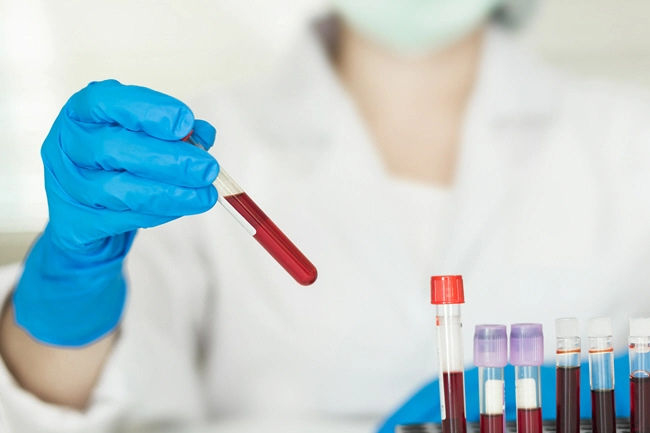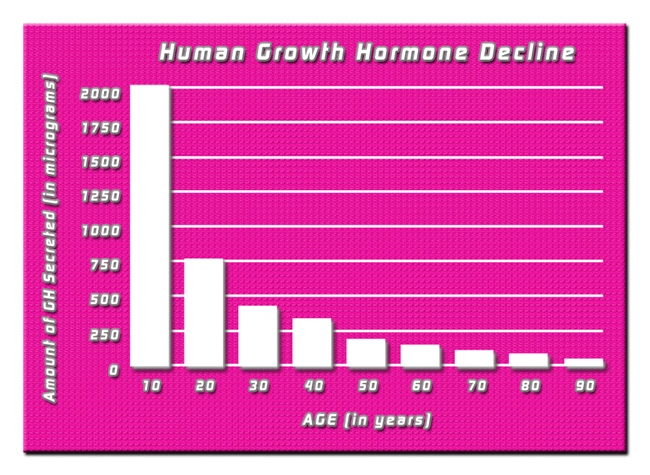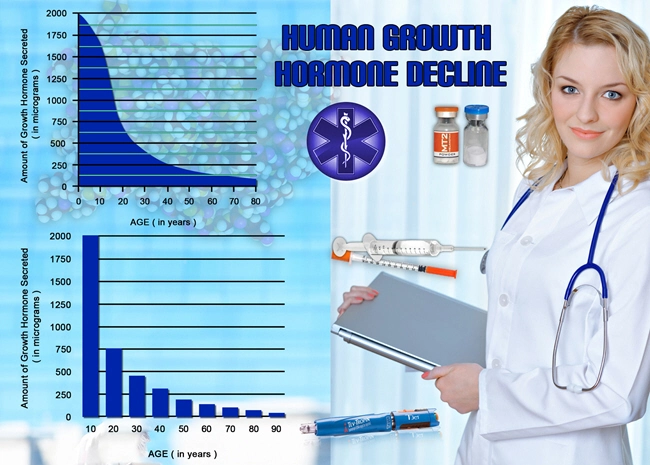
Introduction
Growth hormone deficiency (GHD) in adults can lead to a variety of symptoms, including reduced muscle mass, increased fat mass, and diminished quality of life. Among these, psychiatric conditions such as depression and anxiety have been increasingly recognized as significant concerns. Omnitrope, a recombinant human growth hormone, has been used to treat GHD, but its effects on psychiatric health, particularly in American men, warrant a closer examination.
Understanding Growth Hormone Deficiency
Growth hormone deficiency in adults often results from pituitary gland damage, which can occur due to tumors, surgery, or radiation therapy. Men with GHD may experience a range of symptoms, from physical changes like decreased bone density to psychological issues such as mood swings and depression. The impact of GHD on mental health is profound, making it essential to consider comprehensive treatment options.
Omnitrope: A Therapeutic Option
Omnitrope is a biosimilar to human growth hormone, designed to mimic the natural hormone's effects. It is administered via subcutaneous injection and has been approved for the treatment of GHD in both children and adults. While its primary role is to address the physical manifestations of GHD, recent studies have begun to explore its potential benefits on psychiatric health.
Psychiatric Effects of Omnitrope
Research into the psychiatric effects of Omnitrope in men with GHD has yielded promising results. A study published in the *Journal of Clinical Endocrinology & Metabolism* found that men treated with Omnitrope reported significant improvements in mood and overall well-being compared to a placebo group. These improvements were measured using standardized psychiatric scales, indicating a reduction in symptoms of depression and anxiety.
Mechanisms of Action
The exact mechanisms by which Omnitrope may improve psychiatric health are not fully understood. However, it is hypothesized that growth hormone plays a role in regulating neurotransmitter systems, such as serotonin and dopamine, which are crucial for mood regulation. By restoring growth hormone levels, Omnitrope may help normalize these neurotransmitter pathways, leading to improved mental health outcomes.
Clinical Considerations
When considering Omnitrope for men with GHD, clinicians must weigh the potential benefits against the risks. Side effects of Omnitrope can include joint and muscle pain, fluid retention, and, in rare cases, increased risk of diabetes. Monitoring for these side effects is crucial, as is regular assessment of psychiatric symptoms to ensure the treatment is effective.
Patient Perspectives
From a patient's perspective, the use of Omnitrope can be life-changing. Men who have struggled with the dual burden of GHD and psychiatric conditions often report feeling more energized and emotionally stable after starting treatment. These anecdotal reports align with clinical findings, suggesting that Omnitrope may offer a dual benefit for those affected by GHD.
Future Research Directions
While current evidence supports the use of Omnitrope for improving psychiatric health in men with GHD, further research is needed. Longitudinal studies that follow patients over extended periods could provide more insight into the long-term effects of Omnitrope on mental health. Additionally, larger-scale randomized controlled trials would help confirm the preliminary findings and establish Omnitrope as a standard treatment option for this population.
Conclusion
Omnitrope represents a promising therapeutic option for American men suffering from growth hormone deficiency, particularly those with co-existing psychiatric conditions. By addressing both the physical and mental health aspects of GHD, Omnitrope offers a holistic approach to treatment. As research continues to evolve, it is hoped that Omnitrope will become an increasingly recognized tool in the management of GHD and its associated psychiatric symptoms, improving the quality of life for many men across the United States.
Contact Us Today For A Free Consultation
Dear Patient,
Once you have completing the above contact form, for security purposes and confirmation, please confirm your information by calling us.
Please call now: 1-800-380-5339.
Welcoming You To Our Clinic, Professor Tom Henderson.

- Unveiling the Cardiovascular Benefits of Omnitrope in Growth Hormone Deficient American Males [Last Updated On: February 21st, 2025] [Originally Added On: February 21st, 2025]
- Omnitrope: Guide for American Males on Usage, Risks, and Monitoring [Last Updated On: February 22nd, 2025] [Originally Added On: February 22nd, 2025]
- Exploring the Impact of Omnitrope on Cognitive Development in Children: A Comprehensive Medical Analysis [Last Updated On: March 11th, 2025] [Originally Added On: March 11th, 2025]
- Unveiling the Journey of Omnitrope: From Manufacturing to Medical Application [Last Updated On: March 15th, 2025] [Originally Added On: March 15th, 2025]
- Unveiling the Potential of Omnitrope in Addressing Pediatric Growth Disorders Among American Males [Last Updated On: March 16th, 2025] [Originally Added On: March 16th, 2025]
- Unveiling the Therapeutic Potential of Omnitrope in Pediatric Inflammatory Bowel Disease Management [Last Updated On: March 16th, 2025] [Originally Added On: March 16th, 2025]
- Unveiling the Therapeutic Potential of Omnitrope in Managing Noonan Syndrome [Last Updated On: March 16th, 2025] [Originally Added On: March 16th, 2025]
- Exploring the Dermatological Benefits of Omnitrope in Growth Hormone Deficient American Males [Last Updated On: March 16th, 2025] [Originally Added On: March 16th, 2025]
- Unveiling the Therapeutic Potential of Omnitrope in Managing Growth Hormone Deficiency Among American Males with Epilepsy [Last Updated On: March 16th, 2025] [Originally Added On: March 16th, 2025]
- Omnitrope: A Hopeful Solution for Growth Disorders in American Boys [Last Updated On: March 17th, 2025] [Originally Added On: March 17th, 2025]
- Omnitrope Enhances Insulin Sensitivity in American Males with Growth Hormone Deficiency [Last Updated On: March 18th, 2025] [Originally Added On: March 18th, 2025]
- Omnitrope's Role in Managing Lipid Profiles in American Men with GHD [Last Updated On: March 18th, 2025] [Originally Added On: March 18th, 2025]
- Omnitrope Therapy Enhances Muscle Strength in American Adult Males with GHD [Last Updated On: March 19th, 2025] [Originally Added On: March 19th, 2025]
- Omnitrope Therapy: Effects on Bone Age and Growth in American Males [Last Updated On: March 19th, 2025] [Originally Added On: March 19th, 2025]
- Omnitrope: Enhancing Growth and Quality of Life in Noonan Syndrome Patients [Last Updated On: March 19th, 2025] [Originally Added On: March 19th, 2025]
- Omnitrope for Adolescent Growth: Indications, Dosage, Monitoring, and Psychosocial Impact [Last Updated On: March 20th, 2025] [Originally Added On: March 20th, 2025]
- Omnitrope: Enhancing Growth and Life Quality in American Males with Idiopathic Short Stature [Last Updated On: March 20th, 2025] [Originally Added On: March 20th, 2025]
- Omnitrope: Enhancing Growth in SGA Infants - Mechanism, Efficacy, and Safety [Last Updated On: March 20th, 2025] [Originally Added On: March 20th, 2025]
- Optimizing Omnitrope Therapy for Growth Hormone Deficiency in American Males [Last Updated On: March 20th, 2025] [Originally Added On: March 20th, 2025]
- Omnitrope: Enhancing Final Height in American Boys with Growth Hormone Deficiency [Last Updated On: March 21st, 2025] [Originally Added On: March 21st, 2025]
- Omnitrope: Advancing Regenerative Medicine for American Males [Last Updated On: March 21st, 2025] [Originally Added On: March 21st, 2025]
- Omnitrope: Enhancing Growth and Quality of Life in IUGR Children in the US [Last Updated On: March 22nd, 2025] [Originally Added On: March 22nd, 2025]
- Omnitrope: Enhancing Health and Quality of Life in American Males with GHD [Last Updated On: March 22nd, 2025] [Originally Added On: March 22nd, 2025]
- Omnitrope Therapy: Enhancing Growth in American Male Cancer Survivors with GHD [Last Updated On: March 22nd, 2025] [Originally Added On: March 22nd, 2025]
- Omnitrope: Enhancing Growth in Children with Chronic Illnesses [Last Updated On: March 23rd, 2025] [Originally Added On: March 23rd, 2025]
- Omnitrope's Role in Managing Hypopituitarism for American Males: Efficacy and Considerations [Last Updated On: March 23rd, 2025] [Originally Added On: March 23rd, 2025]
- Omnitrope Therapy Enhances Sleep Quality in American Males with Growth Hormone Deficiency [Last Updated On: March 23rd, 2025] [Originally Added On: March 23rd, 2025]
- Omnitrope: A Key Therapy for Growth Hormone Deficiency and Thyroid Disorders in Males [Last Updated On: March 24th, 2025] [Originally Added On: March 24th, 2025]
- Omnitrope Enhances Immune Function in Growth Hormone Deficient American Males [Last Updated On: March 24th, 2025] [Originally Added On: March 24th, 2025]
- Omnitrope: Treating Growth Hormone Deficiency and Obesity in American Males [Last Updated On: March 24th, 2025] [Originally Added On: March 24th, 2025]
- Omnitrope's Impact on Liver Function in American Males with Growth Hormone Deficiency [Last Updated On: March 24th, 2025] [Originally Added On: March 24th, 2025]
- Omnitrope: Effective GHD Treatment in American Males with Autoimmune Diseases [Last Updated On: March 24th, 2025] [Originally Added On: March 24th, 2025]
- Omnitrope: Enhancing Quality of Life in HIV Patients with Growth Hormone Deficiency [Last Updated On: March 24th, 2025] [Originally Added On: March 24th, 2025]
- Omnitrope Therapy in Children: Monitoring Renal Function and Long-term Effects [Last Updated On: March 24th, 2025] [Originally Added On: March 24th, 2025]
- Omnitrope's Efficacy in Treating GHD in American Males with Epilepsy [Last Updated On: March 24th, 2025] [Originally Added On: March 24th, 2025]
- Omnitrope: Enhancing Life for American Males with Short Bowel Syndrome [Last Updated On: March 25th, 2025] [Originally Added On: March 25th, 2025]
- Omnitrope: Treating Growth Hormone Deficiency and Rheumatoid Arthritis in American Males [Last Updated On: March 25th, 2025] [Originally Added On: March 25th, 2025]
- Omnitrope: Enhancing Growth and Life Quality in American Males with Hemophilia and GHD [Last Updated On: March 25th, 2025] [Originally Added On: March 25th, 2025]
- Omnitrope: Enhancing Growth and Quality of Life in Down Syndrome GHD [Last Updated On: March 25th, 2025] [Originally Added On: March 25th, 2025]
- Omnitrope Enhances Psychological Well-being in Men with Growth Hormone Deficiency [Last Updated On: March 25th, 2025] [Originally Added On: March 25th, 2025]
- Omnitrope's Impact on GHD in American Males with Multiple Sclerosis: Benefits and Considerations [Last Updated On: March 26th, 2025] [Originally Added On: March 26th, 2025]
- Omnitrope: Enhancing Bone Health in American Males with GHD and Osteoporosis [Last Updated On: March 26th, 2025] [Originally Added On: March 26th, 2025]
- Omnitrope: Enhancing Growth in American Boys with Cystic Fibrosis [Last Updated On: March 26th, 2025] [Originally Added On: March 26th, 2025]
- Omnitrope Therapy: Enhancing Growth and Eye Health in Children [Last Updated On: March 26th, 2025] [Originally Added On: March 26th, 2025]
- Omnitrope's Impact on Respiratory Function in American Males with GHD [Last Updated On: March 26th, 2025] [Originally Added On: March 26th, 2025]
- Omnitrope: A Tailored Treatment for GHD and Diabetes in American Males [Last Updated On: March 26th, 2025] [Originally Added On: March 26th, 2025]
- Omnitrope's Impact on Hematological Parameters in American Males with GHD [Last Updated On: March 26th, 2025] [Originally Added On: March 26th, 2025]
- Omnitrope's Efficacy in Enhancing Growth in American Males with Congenital Heart Disease [Last Updated On: March 26th, 2025] [Originally Added On: March 26th, 2025]
- Omnitrope Therapy Enhances Gastrointestinal Health in American Male Children [Last Updated On: March 27th, 2025] [Originally Added On: March 27th, 2025]
- Omnitrope: Enhancing Neurological Function in Growth Hormone Deficient Patients [Last Updated On: March 27th, 2025] [Originally Added On: March 27th, 2025]
- Omnitrope's Role in Treating GHD in American Males with Sickle Cell Disease [Last Updated On: March 27th, 2025] [Originally Added On: March 27th, 2025]
- Omnitrope's Role in Treating PCOS-Related GHD: Benefits for American Males [Last Updated On: March 27th, 2025] [Originally Added On: March 27th, 2025]
- Omnitrope: A Tailored Treatment for GHD in Asthmatic American Males [Last Updated On: March 27th, 2025] [Originally Added On: March 27th, 2025]
- Omnitrope Therapy's Impact on Skin Health in Pediatric Patients: A Comprehensive Review [Last Updated On: March 27th, 2025] [Originally Added On: March 27th, 2025]
- Omnitrope's Potential in Managing Autism Spectrum Disorders: Insights for American Families [Last Updated On: March 28th, 2025] [Originally Added On: March 28th, 2025]
- Omnitrope Therapy's Impact on Auditory Health in Pediatric Patients: Insights for American Males [Last Updated On: March 29th, 2025] [Originally Added On: March 29th, 2025]
- Omnitrope Therapy: Impacts on Dental Health in Children [Last Updated On: March 29th, 2025] [Originally Added On: March 29th, 2025]
- Omnitrope: A Potential Treatment for Growth Hormone Deficiency and Chronic Fatigue Syndrome [Last Updated On: March 29th, 2025] [Originally Added On: March 29th, 2025]
- Omnitrope's Efficacy in Managing IBD in American Male Children: A Review [Last Updated On: March 29th, 2025] [Originally Added On: March 29th, 2025]
- Omnitrope Enhances Reproductive Health in American Males with Growth Hormone Deficiency [Last Updated On: March 30th, 2025] [Originally Added On: March 30th, 2025]
- Omnitrope Therapy Enhances Musculoskeletal Health in American Male Children [Last Updated On: April 1st, 2025] [Originally Added On: April 1st, 2025]
- Omnitrope: Enhancing Endocrine Function in American Males with Growth Hormone Deficiency [Last Updated On: April 2nd, 2025] [Originally Added On: April 2nd, 2025]
- Omnitrope's Role in Treating GHD and Fibromyalgia in American Males [Last Updated On: April 5th, 2025] [Originally Added On: April 5th, 2025]
- Omnitrope Therapy Enhances Urological Health in Growth-Deficient American Male Children [Last Updated On: April 6th, 2025] [Originally Added On: April 6th, 2025]
- Omnitrope's Efficacy in Managing Allergic Rhinitis in American Children [Last Updated On: April 7th, 2025] [Originally Added On: April 7th, 2025]
- Omnitrope: A Dual Approach to GHD and Psoriasis in American Males [Last Updated On: April 7th, 2025] [Originally Added On: April 7th, 2025]
- Omnitrope Enhances Skin Health in American Males with Growth Hormone Deficiency [Last Updated On: April 8th, 2025] [Originally Added On: April 8th, 2025]
- Omnitrope Therapy: Enhancing Growth and Nutrition in Children with Growth Disorders [Last Updated On: April 8th, 2025] [Originally Added On: April 8th, 2025]
- Omnitrope's Impact on Geriatric Health in American Males with GHD [Last Updated On: April 9th, 2025] [Originally Added On: April 9th, 2025]
- Omnitrope: Managing Growth Hormone Deficiency and Eczema in American Males [Last Updated On: April 9th, 2025] [Originally Added On: April 9th, 2025]
- Omnitrope's Role in Treating Anorexia Nervosa in American Males: Benefits and Risks [Last Updated On: April 9th, 2025] [Originally Added On: April 9th, 2025]
- Omnitrope's Role in Treating GHD in American Males with Schizophrenia: Benefits and Considerations [Last Updated On: April 12th, 2025] [Originally Added On: April 12th, 2025]









